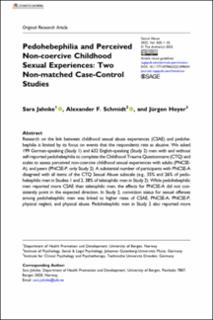Pedohebephilia and Perceived Non-coercive Childhood Sexual Experiences: Two Non-matched Case-Control Studies
Journal article, Peer reviewed
Published version

Åpne
Permanent lenke
https://hdl.handle.net/11250/3039363Utgivelsesdato
2022Metadata
Vis full innførselSamlinger
Sammendrag
Research on the link between childhood sexual abuse experiences (CSAE) and pedohebephilia is limited by its focus on events that the respondents rate as abusive. We asked 199 German-speaking (Study 1) and 632 English-speaking (Study 2) men with and without self-reported pedohebephilia to complete the Childhood Trauma Questionnaire (CTQ) and scales to assess perceived non-coercive childhood sexual experiences with adults (PNCSE-A), and peers (PNCSE-P, only Study 2). A substantial number of participants with PNCSE-A disagreed with all items of the CTQ Sexual Abuse subscale (e.g., 35% and 26% of pedohebephilic men in Studies 1 and 2, 38% of teleiophilic men in Study 2). While pedohebephilic men reported more CSAE than teleiophilic men, the effects for PNCSE-A did not consistently point in the expected direction. In Study 2, conviction status for sexual offenses among pedohebephilic men was linked to higher rates of CSAE, PNCSE-A, PNCSE-P, physical neglect, and physical abuse. Pedohebephilic men in Study 2 also reported more PNCSE-P than teleiophilic men. Our results highlight the importance of assessing different (positive or neutral) perceptions of CSAE. Better controlled designs (e.g., matched case-control studies) are needed to substantiate whether and how perceived non-coercive childhood sexual experiences relate to pedohebephilia and sexual offending.
